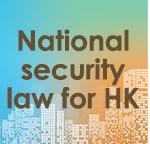Political scientist Mervyn Cheung Man-ping said some leaders of Hong Kong universities helped fuel last year’s campus unrest through their silence and “vague expressions”. Now, Cheung — a member of the Chinese Association of Hong Kong and Macau Studies — is calling on universities to take the initiative to ensure there are no illegal activities on campus and that the National Security Law is upheld.
Cheung contends the indifferent responses to the violence by some universities, under the pretext of academic freedom, were seized upon by students and teachers as a show of support for the anti-government movement.
Cheung, who is also chairman of the Hong Kong Education Policy Concern Organization, argued that universities have the responsibility to protect their respective campuses, while acknowledging that the National Security Law stipulates that the special administrative region government has the primary responsibility for ensuring that schools and universities are brought under closer supervision. He said there must be full compliance with the law to ensure a pluralistic and free education environment in the city.
Universities have the responsibility to protect their respective campuses, ... There must be full compliance with the law to ensure a pluralistic and free education environment in the city
Mervyn Cheung Man-ping,
Hong Kong barrister
Under the law, schools and universities are instructed to help underscore the importance of national security among residents and students.
“I would think that there should be a very serious consideration at the university governing level on the ways that the knowledge, understanding, and compliance regarding the new national security legislation should be done and taken forward proactively,” Cheung said.
There should be a structure to ensure proper implementation of the instructions from the government to protect national security on campus, he said. As an example, he argued that universities should be prepared to report back to their grants council, the University Grants Committee, on their efforts to promote national security awareness among students.
This is not a new obligation, he said. All university ordinances have provisions requiring that university councils govern their institutions’ affairs and aims, and ensure the functions of the universities. The National Security Law, which criminalizes four activities that endanger national security in the city, gives them a direction to work toward to keep things running smoothly, he said.
He also suggested the education department convene a central office of officials and experts in law, management, education, and other academies to provide centralized support and guidance to universities so that teaching and other activities are in line with the National Security Law.
The expectations placed on the management of universities for smooth operations of their campuses were dashed over the past year. Schools were forced to close temporarily to avoid some of the most appalling violence sweeping the city. Cheung cited lethal weapons, mass-produced by radicals, including gasoline bombs, used against police on two local campuses.
Another failure attributed to campus management was the high level of participation by students in illegal activities that disrupted commerce, damaged property and interfered with the daily lives of the population at large. As of May 29, more than 40 percent of the 8,981 people arrested for illegal activities were students, according to the city’s police force.
Now, universities should be required to cooperate with law enforcement on national security matters and to refrain from concealing illegal activities from authorities, he said.
In fact, school management should be advised or even instructed to report cases that in their opinion involve commission of any illegal acts under the law, he said.
This requires clear and detailed guidelines from authorities on what the teachers should not do, Cheung said. “For instance, they should not impose their personal political beliefs on students or even mislead them into illegal acts that run counter to Hong Kong’s laws and also the national security legislation,” he added.
Cheung dismissed claims that those rules on campus infringe on academic freedom, saying any attempt to discredit national safety in the city was “nonsense”.
On the contrary, he said, the constraints on extreme political activities would create a truly open learning environment in universities. The actions are truly conducive to the advancement of the students.
The students are still in the formative years of their lives. They are supposed to remain open to different ideas in their studies, especially the most important social issues and topics, rather than prepared to sacrifice their future fighting for a certain point of view, he added.
For some controversial political subjects, “they can do research, they can discuss, but they should keep the spirit of learning from differences,” he said.
Unfortunately, many of these so-called learning discussions were used by radical groups. They implanted the idea of lawlessness in the minds of students and prevented them from critical thinking. Their aim was to mislead the students into committing illegal acts to realize the political intentions of a certain group.
Universities should also take this opportunity to reflect on their quality education, and strengthen their efforts to develop civic literacy, including respect and rational response to disagreements, or a firm commitment to peace and order. These educational objectives can be proposed, discussed with the central professional instructive body for national security that he suggested earlier, and seek their support, he said.



